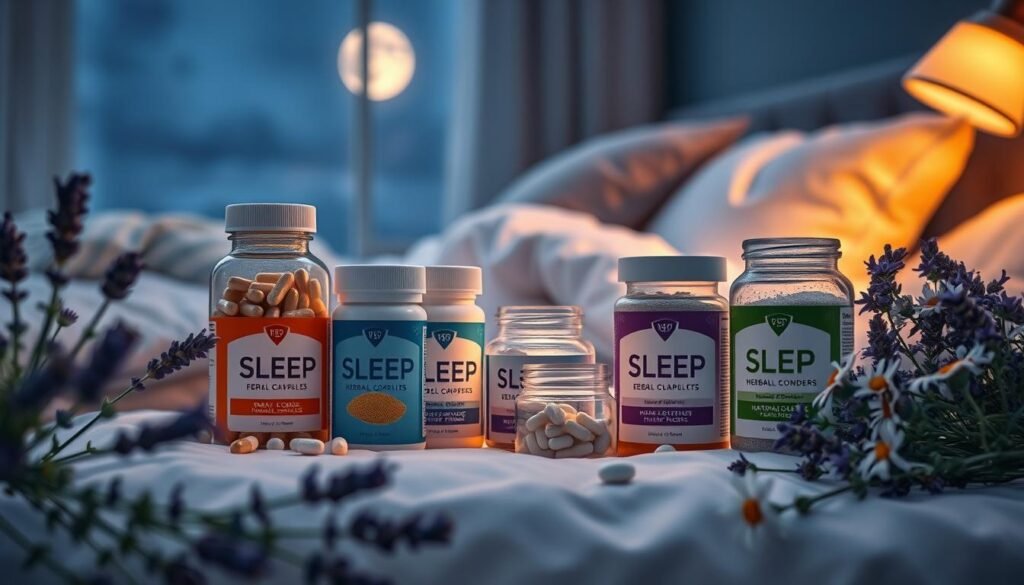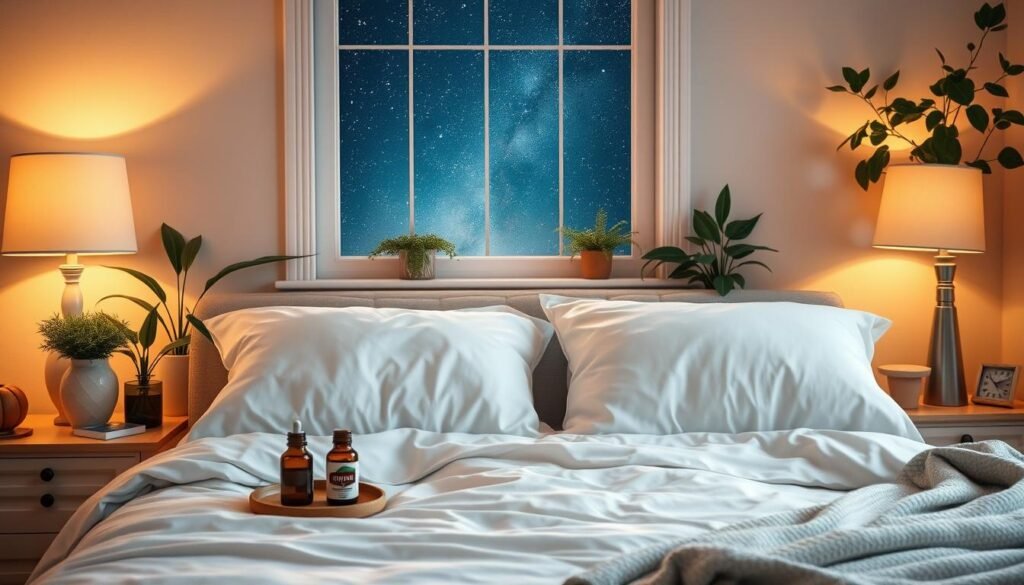Did you know over 60 million Americans have trouble sleeping well? This fact shows that we need to look into multiple solutions for better sleep. Good sleep is crucial for staying healthy, not just for feeling rested.
Lack of sleep can lead to severe health issues. These include heart disease, diabetes, and obesity. But, there’s good news. There are many sleep aids and natural remedies out there. They can help improve how well you sleep.
By combining different methods, such as herbal aids and better sleep habits, you can find what works best for you. This way, you can enjoy sleep that actually refreshes you.
Key Takeaways
- Approximately 20% of adults experience occasional symptoms of insomnia.
- Quality sleep is linked to a lower risk of chronic health issues such as heart disease and diabetes.
- Melatonin and valerian root are effective supplements that can improve sleep quality.
- Creating a calming sleep environment is crucial for achieving restorative sleep.
- Natural remedies like lavender and chamomile can enhance the sleep experience.
Understanding the Importance of Quality Sleep
Quality sleep is vital for our health and happiness. It does more than just rest our bodies. It helps our brain work better, balances our emotions, and keeps our bodies strong. People who sleep well tend to remember things better, learn easier, and make smarter decisions.
Benefits of Good Sleep for Health
Getting enough sleep has lots of benefits. Doctors say adults should sleep about seven to eight hours to feel their best. Sleeping well can lower the chance of getting sick with things like heart disease, diabetes, or gaining too much weight. Doing things like exercise and meditation can help you sleep deeper.
Risks Associated with Insufficient Sleep
Not sleeping enough can cause big problems for your health. It can make you feel anxious, quickly irritated, and cause mood changes. Not sleeping over time can lead to serious health issues. It’s important to know how bad sleep can affect us.
Bad sleep can hurt your brain’s ability to remember and think clearly. It can also mess up your body’s clock. People who don’t rest well might feel more anxious or depressed. To learn more about how sleep affects your mood, check out this resource.
| Aspect | Importance of Good Sleep | Risks of Insufficient Sleep |
|---|---|---|
| Sleep Duration | 7-8 hours recommended for adults | Increased fatigue and reduced performance |
| Cognitive Function | Enhanced memory and learning | Poor decision-making and memory loss |
| Emotional Health | Mood stability and emotional regulation | Increased anxiety and mood swings |
| Overall Health | Lower risk of chronic diseases | Higher susceptibility to illness |
Common Causes of Insomnia
Knowing the Causes of Insomnia is key for solving sleep problems. A lot of things can lead to insomnia, but Stress and Anxiety are on the top of the list. When you’re feeling stressed or anxious, it’s hard to fall or stay asleep. These feelings make your thoughts race and keep you too alert to rest well.
Stress and Anxiety
Stress and Anxiety can make insomnia worse, creating a tough cycle. Life’s daily pressures, like work stress or personal issues, can prevent your mind from relaxing. Knowing what stresses you out and finding ways to manage it can help you sleep better.
Irregular Sleep Hygiene
Your sleep habits can also be messed up by bad Sleep Hygiene. Things like not having a regular bedtime and a bad sleeping area can disrupt your body’s clock. Making a restful routine before bed and keeping your sleeping area comfy are important for better sleep.
Medical Conditions
Lasting health issues can also affect your sleep. Problems like chronic pain, breathing issues, or hormone shifts can stop you from getting good sleep. Understanding and treating any health problems is crucial for dealing with sleep-related issues. Seeing sleep problems from different angles shows ways to sleep better.
Combination of Remedies for Effective Sleep
Finding the best way to improve sleep often means trying different methods. Combining remedies can greatly boost sleep quality. Natural Sleep Aids and Herbal Sleep Solutions are widely recognized for their benefits.
Natural Sleep Aids Overview
Melatonin and L-Theanine are key in enhancing sleep patterns. Melatonin is extremely popular, with many American adults using it. L-Theanine helps ease stress and encourages relaxation, which leads to better sleep. Older adults with insomnia may find magnesium beneficial, highlighting the importance of a well-rounded approach to improving sleep.
Herbal Sleep Solutions
Herbal Sleep Solutions have a long history in various cultures. Valerian root, known for its soothing effects, is most effective at doses of 300 to 600 milligrams before bedtime. A mix of hops and valerian might also improve sleep, but results can differ from person to person. Chamomile extract is another herb that promotes sleep, especially in those over 65. It also lowers anxiety, improving sleep quality in two ways.
| Natural Sleep Aids | Dosage | Benefits |
|---|---|---|
| Melatonin | Varies (common 1-5 mg) | Helps regulate sleep-wake cycles |
| L-Theanine | 100-400 mg | Reduces stress and anxiety; enhances relaxation |
| Magnesium | 250-350 mg | May improve sleep quality in older adults |
| Valerian Root | 300-600 mg | Improves sleep quality; helps with insomnia |
| Chamomile Extract | 200 mg | Enhances sleep quality; reduces anxiety |
Exploring Natural Sleep Remedies
Today, many people have trouble sleeping and look for solutions. Natural Sleep Remedies are a popular choice. We will talk about three options: Melatonin, Valerian Root, and Magnesium. These can help you sleep better.
Melatonin: The Sleep Hormone
Melatonin is made in the brain and helps control sleep. It’s especially helpful for older people who can’t sleep well. Melatonin can make sleep better and help you wake up feeling fresh. But, it can also cause daytime tiredness, headaches, and feeling sick.
It’s important to find the right amount to take.
Valerian Root for Sleep Quality
Valerian Root is a natural way to sleep better. Some research shows it can make sleep quality better. But, it might make you dizzy or upset your stomach. Using Valerian Root might improve sleep for those who find it hard to sleep.
Magnesium and Its Role in Sleep
Magnesium helps relax muscles and manage melatonin, making you sleep better. It can help you fall asleep faster and sleep longer. Too much magnesium can cause stomach pain and nausea. Eating foods high in magnesium at night can help you sleep.

Natural Sleep Remedies provide different ways to sleep better. What works varies from person to person. Trying different methods is key. For more ideas on how to sleep well, check out natural sleep aids.
| Remedy | Benefits | Possible Side Effects |
|---|---|---|
| Melatonin | Regulates sleep-wake cycle, improves sleep quality | Daytime drowsiness, headache, nausea |
| Valerian Root | May enhance sleep quality | Dizziness, gastrointestinal discomfort |
| Magnesium | Aids muscle relaxation, regulates melatonin | Stomach cramping, nausea, vomiting |
Herbal Sleep Solutions: An In-Depth Look
Herbal Sleep Solutions are getting a lot of notice for helping improve sleep. Lavender and Passionflower are very popular. They are known for their unique effects on making us relax.
Lavender and Aromatherapy
Lavender aromatherapy is quite popular for getting good sleep. The lavender scent helps slow your heart rate and lowers blood pressure. It also reduces skin temperature. These changes help you sleep better.
Using lavender at night can really help. You can use essential oils or herbal teas with lavender. A 2021 study in the International Journal of Pharmacy Practice showed lavender helps reduce anxiety and improves sleep.
Passionflower and Its Benefits
Passionflower is another great herb for sleep. It has compounds that relax your nerves. This lowers stress and helps you sleep better. You can take it as a supplement or tea. It’s really good at reducing anxiety and sleep problems.
Different people may see different results. But, many say it’s a great help for sleep. Passionflower is especially good for managing insomnia. It’s one of the top natural choices.
| Herb | Benefits | Usage |
|---|---|---|
| Lavender | Reduces anxiety, enhances sleep quality | Aromatherapy, oils, tea |
| Passionflower | Improves sleep quality, lowers stress | Supplements, tea |
Around a third of adults in the United States have trouble sleeping well at night. Herbal remedies can play a big role in solving that. For more info, looking at additional research can give you more insights. It shows how natural herbs help with sleep problems.
Evaluating Sleep Supplements
When looking at sleep supplements, knowing what they do and their science is key. About 10-20% of adults struggle with sleep issues like insomnia. This fact underlines the need for effective solutions, such as Sleep Supplements. These products may help, but they’re not always strictly checked. This lack can affect how well and safely they work. So, understanding both benefits and risks is crucial when considering Sleep Aids.
Understanding Sleep Supplements
Many people use sleep supplements, including melatonin, to sleep better. Most adults need 7-9 hours of sleep but might not get enough due to various reasons. Genetics, lifestyle, and where you live can all affect sleep. Studies show that genetics play a big role in how long we sleep. So, knowing what’s in these supplements and how they work is important for good results.
Potential Side Effects of Common Supplements
Sleep Supplements can help but also have side effects. For example, Zolpidem, a common sleep medication, has been tied to thinking problems. This is especially true for military members who have unique sleep challenges. Mixing supplements without advice can lead to more issues. Therefore, talking to a doctor and knowing the right amount is essential. This approach helps ensure the supplements are both safe and effective.
| Supplement | Benefits | Common Side Effects |
|---|---|---|
| Melatonin | Regulates sleep-wake cycle, improves sleep onset | Drowsiness, dizziness, headaches |
| Valerian Root | May reduce the time taken to fall asleep | Upset stomach, headache, daytime drowsiness |
| Magnesium | Supports overall sleep quality and deep sleep phases | Diarrhea, nausea, abdominal cramping |
| Zolpidem | Promotes quicker sleep initiation | Cognitive impairment, dependency, complex sleep behaviors |

Incorporating Sleep Hygiene Tips
Getting enough quality sleep is key. Poor sleep affects your mind, feelings, and heart health. Making your bedroom better for sleeping is important. Try to make the room cooler, less noisy, and darker. A peaceful bedroom helps you sleep better.
Creating a Restful Sleep Environment
A perfect restful sleep environment needs a not-too-soft, not-too-hard mattress. This helps lessen back pain and makes sleep better. Also, a dark and cool room helps a lot. Blackout curtains and sounds that block out noise help you sleep without interruptions.
Establishing a Sleep Routine
Having a regular sleep pattern tells your body when it’s time to rest. Sleeping and waking up at the same time every day is good for you. It’s also important to avoid caffeine and big meals before you go to bed.
Limiting Screen Time Before Bed
It’s important to use screens less before bedtime. Bright screens mess with melatonin, making it hard to sleep. Have a rule for when to stop using devices. This can help you get into sleep mode better.
Sleep-Inducing Techniques to Try
For those who find it hard to sleep, some methods can really help. These focus on calming the mind and body. They pave the way for a good night’s rest.
Relaxation Methods for Sleep
Relaxation tricks are key for falling asleep easier. Using diaphragmatic breathing and the 4-7-8 breathing technique changes our breath. This switch helps our bodies relax more deeply.
Another tip is progressive muscle relaxation. It’s about tensing then loosening different muscle groups. Visualization also works well to lower stress before bed. These strategies are especially useful for those who often toss and turn.
Mindfulness and Meditation Practices
Mindfulness is becoming popular for stress relief. It includes exercises like mindful meditation. These practices can shorten the time it takes to fall asleep for those with sleeping issues.
Engaging in yoga nidra promotes deeper relaxation and better sleep. It’s great to mix these mindfulness routines with regular relaxation techniques. For the best outcomes, make these practices a regular part of your routine.

When to Consider Professional Help
Knowing when to seek help for insomnia is key to better sleep. Sometimes, people can’t sleep well due to various factors. It’s important to notice when Persistent Insomnia Symptoms occur. These signs may indicate deeper problems. Persistent symptoms often mean it’s time to see a healthcare provider.
Recognizing Persistent Insomnia Symptoms
Watch for these signs if you have insomnia:
- Trouble falling asleep or staying asleep for a long time.
- Feeling tired during the day, which affects your daily activities.
- Having a hard time focusing or making decisions.
- Using more sleep medicine than before.
Lasting insomnia can lead to anxiety, depression, and health issues. If you have these symptoms, it’s good to talk to a doctor. They can check your symptoms and suggest treatments.
Consulting with Sleep Specialists
Talking to sleep specialists can really help. They know how to treat your sleep problems well. They might suggest:
- Cognitive Behavioral Therapy for Insomnia (CBT-i) to look at your sleep habits and thoughts.
- Checking for medical issues that affect sleep.
- Advice on changing your lifestyle to sleep better.
Getting a medical check can show the best treatment options for you. It’s key to not just rely on medicine without a doctor’s advice to avoid dependency.
Quick fixes don’t usually provide lasting relief. Meeting with specialists gives you a full view of your sleep issues. This leads to better sleep over time.
| Symptom | Implication | Recommended Action |
|---|---|---|
| Difficulty initiating sleep | Potential sleep onset insomnia | Consult a specialist for evaluation |
| Excessive daytime sleepiness | Impacting daily life | Consider cognitive behavioral therapy |
| Increased reliance on sleep medications | Risk of dependency | Explore alternative treatments |
Conclusion
Getting good sleep involves many steps. This includes natural aids, herbal solutions, and good sleep habits. Each part is key to better sleep quality and health.
The cost of not sleeping well is huge. It’s about USD 680 billion in major countries. We need to fix sleep problems now more than ever.
There are many remedies to try. But, it’s key to know that herbs like Valerian and Chamomile might not always work. Studies on them are not always clear.
Still, many people try alternative medicines. So, it’s important to find out what works best for you.
By looking at your whole lifestyle, you can find better sleep. Adding advice from doctors too can help a lot. This full view helps tackle sleep problems well.
Understanding sleep aids is powerful. It helps us deal with sleep issues better. And it shows how crucial sleep health is in our lives.